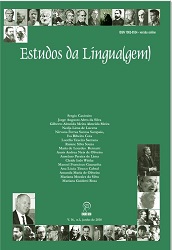Theoretical-methodological and analysis questions that ecoam from the Diary of Narciso
DOI:
https://doi.org/10.22481/el.v16i1.4878Abstract
This paper presents the theoretical assumptions of the works performed in the “Espaço de Convivência entre Afásicos e não afásicos” (ECOA, in the State University of Southwestern Bahia, situated in the municipality of Vitória da Conquista; State of Bahia), according to the precepts present in the book “Diário de Narciso” (1986/1988). For this purpose, the postulates of discursive neurolinguistics, which studies the relation between brain and language in life in community, were taken as a guideline. The analyzed data were collected from longitudinal follow-ups. Analyses are based in the concept so-called “dado-achado” and in a qualitative research. The Interventions of the researchers that were made by means of activities in ECOA, permitted the subject to be inserted into several language usage social practices, they also enabled the aphasic to practice her subjectivity via language, once there were utterances productions during researcher’s mediations.
KEYWORDS: Language. Neurolinguistics. Aphasia.
Downloads
Downloads
Published
How to Cite
Issue
Section
License

Estudos da Língua(gem) is licensed under a Creative Commons Attribution 4.0 International License.
Authors who publish in the journal Estudos da Língua (gem) agree with the following terms:
The journal Estudos de Língua(gem) maintains the copyrights of the contributions published. These rights include the publication of the contribution and make its content available for free through the portal.







